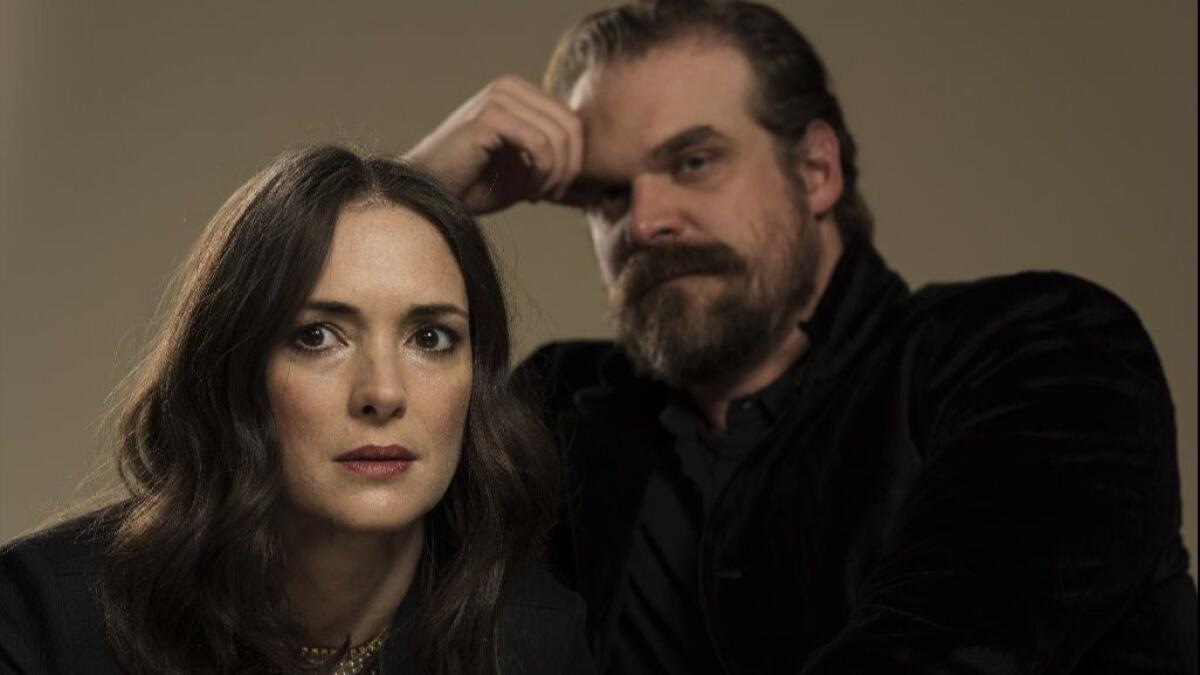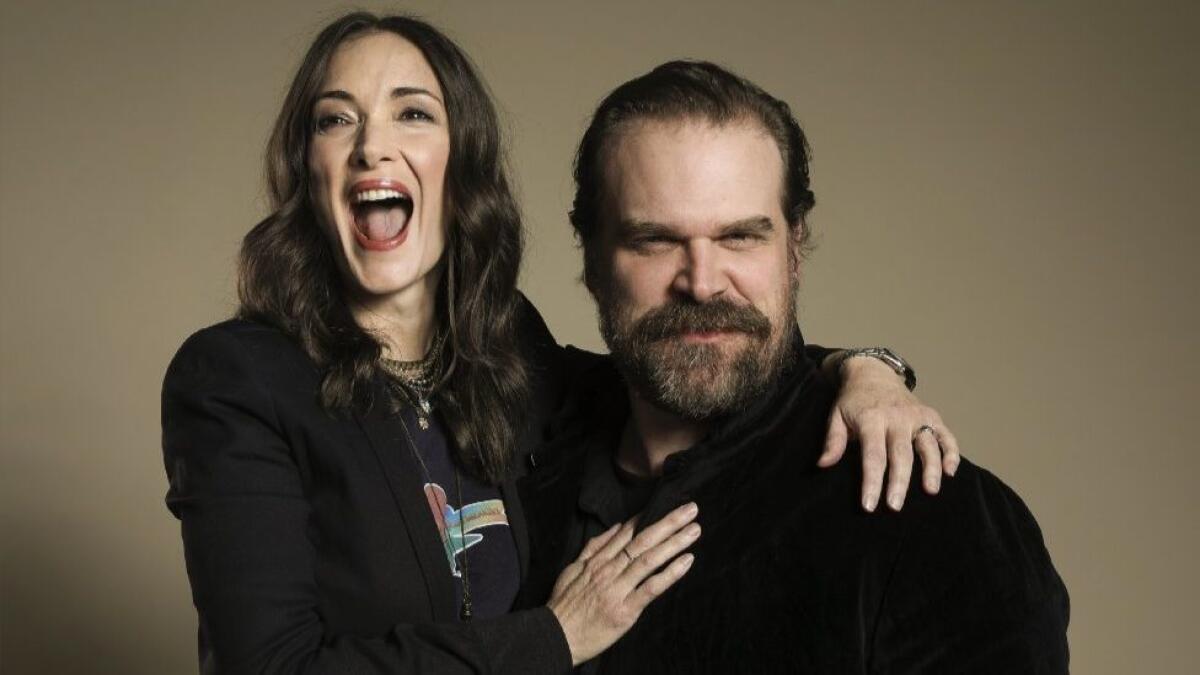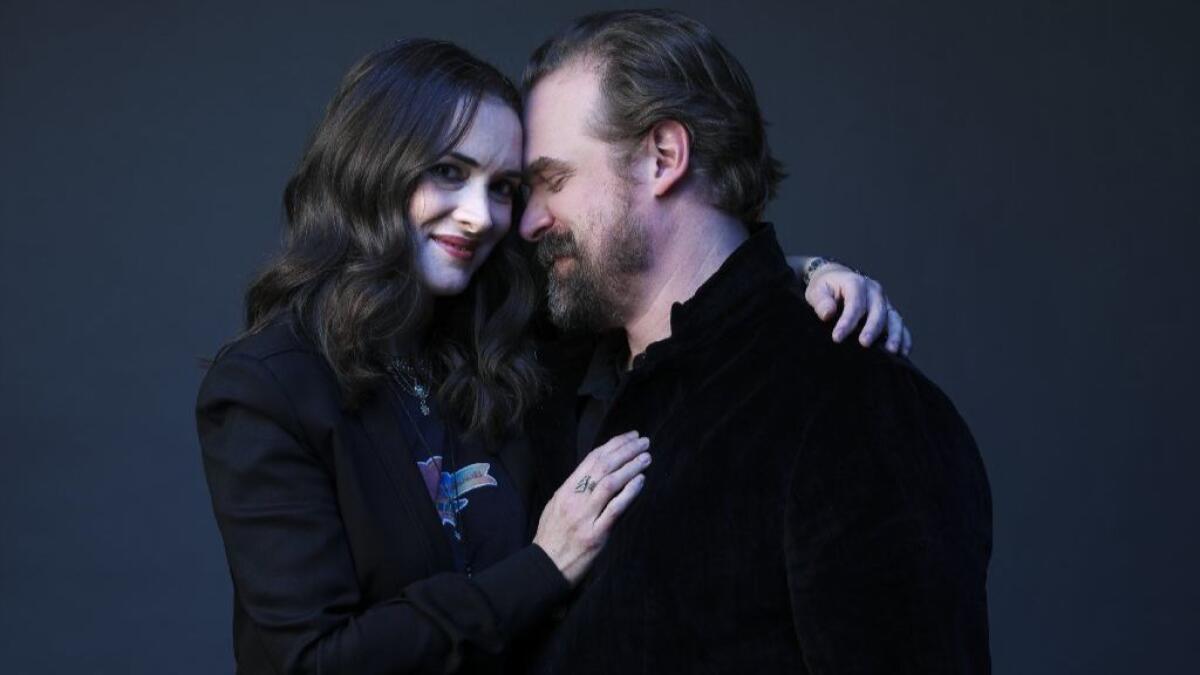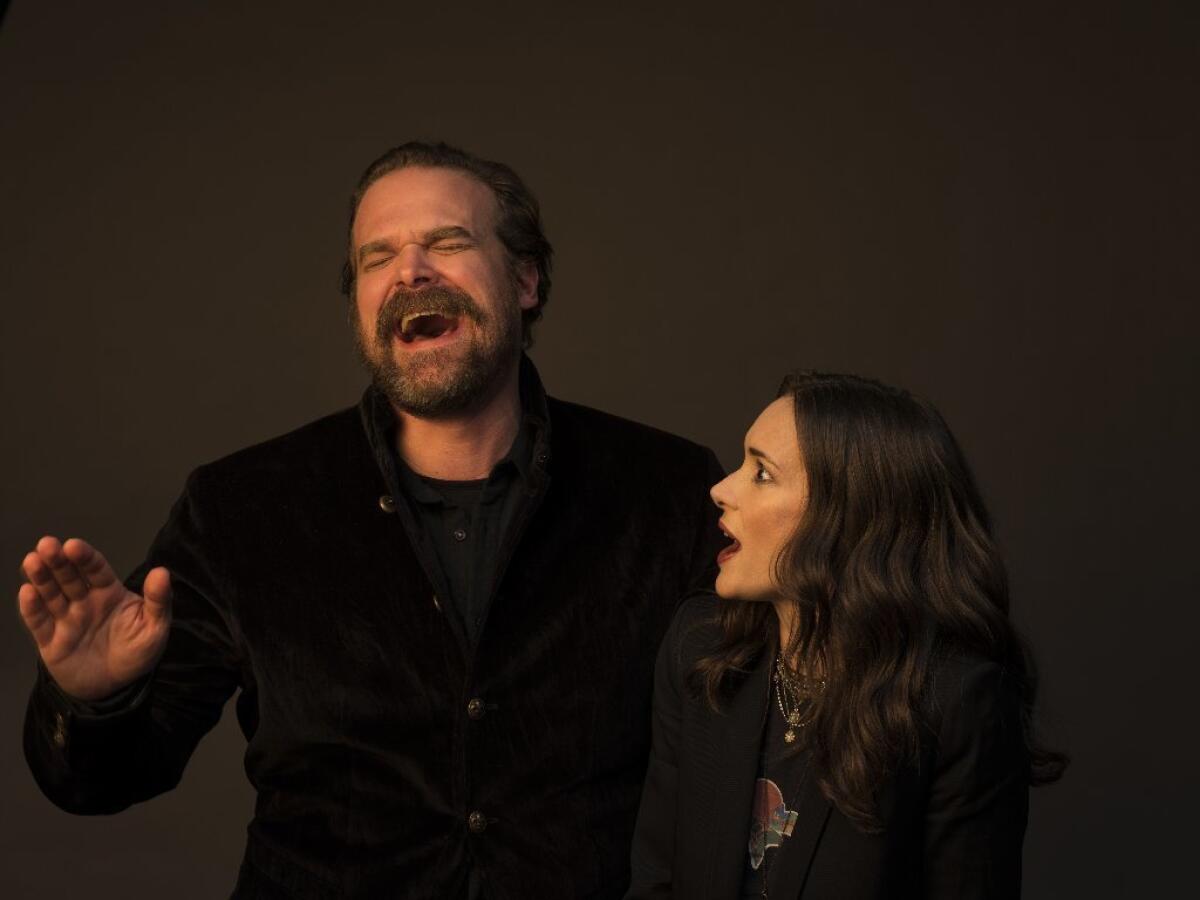Q&A: Winona Ryder and David Harbour share deep bonds on the set of ‘Stranger Things’ — and off

- Share via
Sitting inside the Dolby Theatre’s lounge shortly before a PaleyFest panel for “Stranger Things,” Winona Ryder hears the roar of the not-so-distant crowd and she’s a little confused.
“What is that?” Ryder asks David Harbour.
“It’s the cast of ‘The Wire,’ Winona,” Harbour teases, as it should be self-evident, since they’re about an hour from taking the stage with their “Stranger Things” cast mates, what all the hubbub is about.
“I went to the PaleyFest event for ‘The Wire,’” Ryder replies, ignoring him. “And I was in the audience, kind of going crazy like that. I mean, I got to meet Bunk ...” and here Ryder, as she will, veers off into a bit of a beautiful tangent about the actor Wendell Pierce, who played Det. William “The Bunk” Moreland on David Simon’s celebrated series before circling back to the screaming fans unleashing an explosive clamor upon the young cast members of “Stranger Things.”
“I didn’t even think about boys until I was 16,” Ryder tells Harbour. “When I was 12, boys were the last thing on my mind.” She pauses, frowning. “I worry about them. It’s overwhelming. You think it’s going to last forever. There has always been this false narrative that if you’re an actor, fame comes with the territory and you have to relinquish everything. I remember when all that mattered was that you were in a good movie. That sounds ridiculous today.”
Today, Ryder and Harbour are the adults in the room, anchoring the sideways secrets of “Stranger Things’” Upside Down world with wrenching, emotional performances. Their characters — Harbour’s police chief Jim Hopper and Ryder’s single mother Joyce Byers — have a history that encompasses the past (they dated in high school), the present (Hopper repeatedly helps rescue Joyce’s luckless son, Will) and, undoubtedly, the future. Their on-screen chemistry has turned Joyce and Hopper into one of television’s most shipped pairs (#Jopper), a designation they both relish.
“I’m so hungry to work with Winona because she’s willing to cut me and be cut and we’ll bleed together,” Harbour says. “And that’s a rare thing.”
Just how deeply have you delved into your characters’ past?
Ryder: I have this whole thing with Joyce that maybe she went to Chicago after graduating and got into the hippie thing. Maybe she was there in the Chicago riots.
Harbour: Hopper went to New York, which we know from a box in his basement. He was a New York cop in the ’70s, probably when Frank Serpico was a cop. That would be a fun flashback. Or Hopper calls Serpico in ’85. “Man, I need a favor.”

David, you said in a Reddit AMA that Hopper and Joyce dated in high school, but she dumped him for Lonnie ...
Ryder: AMA?
Harbour: Ask me anything.
Ryder: Ooooh. I didn’t know. But I keep saying “yah.” I didn’t know what young adult means. YA? “Yah?”
Harbour: Calvin [a police officer character on the show] says they screwed.
Ryder: Oh no, he didn’t say that! I don’t know what base we went to, but I don’t think …
[Harbour pulls up a video on his phone of a scene from “Stranger Things,” in which said Calvin posits of Joyce and Hopper: “Chief and her, they screwed before, huh?”]
Harbour: I think they dated in high school. And I think there’s some unfinished business. Both of us toyed around in the beginning about who left who. At the start of the series when she comes to ask for help to find her son, he’s so charming and passive-agressive about it …
Ryder: It’s our first scene …
Harbour: And he says, “I don’t really want to look for your son.” That’s a crazy thing to say. But that anger, that intense reaction has to come from someplace, right? There are people in my life, back in my high school years or early out of college, who burned me in a certain way. If I were to see them again, I’d be right back in high school.
Ryder: We’re that person to some people as well.
Harbour: It’s the idea that the two of us have this flame. I’m not too much of an astrology kind of guy, but they describe this thing as twin flames, which are like soul mates who burn off karma together. You change patterns and burn off karma.
Ryder: [Laughs] Where did you hear about this?
Harbour: I just like the idea of two people who can’t be together because of their pride, because they were burned. But if there’s the potential for vulnerability and growing up, it’s the person that they need most. They’re the only family they could ever have, both of them.
Ryder: It’s interesting too because they don’t have significant others. There’s that thing, it was in “The Age of Innocence,” where the reason you love the person is that they’d never leave their spouse.
Harbour: So what’s the impediment to Joyce and Hopper coming together?
Ryder: Actually, “The Prince of Tides” was on last night [laughs] and at the end, she’s, like, “Part of why I love you is that you always go back to your wife.” And I’m, like, “No, Nick! Stay!”
Harbour: It’s so good, that pulpy stuff!
Ryder: But I think I’m really interested in that twin flame thing. I had never heard that line before — “they screwed.” Knowing how rumors are in high school, hmm. I have ideas. I just don’t know how much I’m allowed to say.
Harbour: The interesting thing about the collaboration with the Duffers [“Stranger Things” creators Matt and Ross Duffer] is that we pitch things. So a lot of these ideas, we don’t want to put out there because they could show up in Season 4. [Dramatic pause] Or Season 3.
Ryder: That was my fear in doing the series. What if you find out you’re, like, a killer down the road? You’d want to play it completely different.
I want to be your Lowenstein from 'Prince of Tides.'
— Winona Ryder to David Harbour
The season finale scene where Hopper and Joyce share a smoke outside the Snow Ball made #Jopper fans swoon. Did you know it was going to elicit such a strong reaction?
Harbour: The funny thing is the scenes that I work on super-hard, people don’t care about. And then the ones we shoot in, like, two minutes are always the ones that elicit gasps.
That scene, you know, Bob [Joyce’s boyfriend] has died and it’d be horrible for Hopper … it’s a sensitive moment. And he’s her friend. So they have this gesture together that isn’t romantic or creepy. It’s like we can bury our feelings in a cigarette together and remember what it was like to be young and innocent.
You did poke the bear on the “Stranger Things” after-show, David, when you said, “The sex would be a lot better with Hopper than it is with Bob.”
Ryder: You said that?!
Harbour: [Stammers] I said that. And the kids were all, like, “[Gasp!]” I will say it’s weird to be an adult, 40-year-old human being and be on a show that is an adult show but is so beloved by kids. Even with my social media. I’m, like, a dude who’s in the world who’s complicated. Like, I have these 13-year-olds who go, “Don’t curse!” [Laughs] The juxtaposition’s a little too much. I want to be Nick Nolte. I don’t know if the whole “don’t curse” thing is going to work.
Ryder: When I grew up, there was a swear jar where if you swore, you had to put $5 in. But then I did “Heathers” and that just went out the window. [Laughs] I remember when we used to have to loop dialogue for airlines and [Al] Pacino used to try to get us to band together and refuse. Because it’s the most ridiculous words. The best is Crispin Glover doing “A River’s Edge.” He just says nonsense.
What about all the fan fiction you read, David, when you were laid up with your torn Achilles tendon. Did you share any of that with Winona?
Ryder: I’m sorry, but what is fan fiction?
Harbour: Basically, people will write, like, “Hopper comes over to Joyce’s house” and there will be a whole story and a lot of it’s kind of smutty too, smutty and weird.
Ryder: I remember meeting the woman who wrote [whispers] “Fifty Shades of Grey” and I thought it was about Wall Street because the book cover had a tie on it. I had no idea. I said, “So, you’re fascinated with Wall Street.” She’s, like, “No.” But she said she started with writing fan fiction for “Twilight.”
I want to do a scene with Winona where I get so messed up that I have to go back to my trailer and cry.
— David Harbour

David, you once compared Hopper and Joyce to Faye Dunaway and Jack Nicholson’s characters in “Chinatown.” Please elaborate.
Ryder: Wow. You don’t think Hopper’s going to slap Joyce, do you?
Harbour: No! Not that! There’s movie relationships that are like throwback relationships and we still use them as tropes to this day. The tropes to me are: Indiana Jones and Marion, Han Solo and Princess Leia and Jack Nicholson and Faye Dunaway.
Ryder: [Scrunches her face] I’m thinking “Cannery Row.”
Harbour: I’m thinking two lost people who don’t think they need anything who actually need each other. And the power of Winona as an actress and the power of … are you ready for this?
Ryder: I want to be your Lowenstein from “Prince of Tides.” He’s driving at the end and [she breaks into a perfect imitation of Nick Nolte’s Southern drawl], “I just say her name: Lowenstein … Lowenstein …”
Harbour: Winona. No. I am going to blow your horn a little bit here. She’s the greatest. She’s so willing to explore personal, intimate things that most actors get to a certain point and go, “That’s enough.” And it’s exploring things about yourself that you don’t necessarily like, the complexities of the human psyche, which is messed up and strange and wonderful and mysterious and horrible.
I do feel like there are moments where you fall in love with Winona. It feels like a marriage, where we’re willing to go the distance in that way that gets really uncomfortable. I want to do a scene with Winona where I get so messed up that I have to go back to my trailer and cry.
Ryder: A lot of actors are, like [adopts a French accent]: “Acting is lying.” But it’s actually finding the truth. The feeling, like you were saying, to go there but also feeling safe and protected. And I just feel like I’m so incredibly lucky to have him. I don’t know what I’d do without him. [Her voice breaks.] I really mean it.
Harbour: Quit it! Oh, my God! See! How can you not fall in love with that human being?
Winona, you seem refreshingly removed from the online world. Did you ever see the viral reaction to all those facial expressions you made during David’s speech at the 2017 SAG Awards?
Ryder: You know the term “viral,” I always think of virus, like the flu, you know? [Laughing] Just to set the record straight, you ran the speech by the kids, but not by me. So that was the first time I was hearing it. And I was trying to follow what he was saying, but it was hard to hear on the stage. I would hear, like, “punch in the face,” but I didn’t hear what he said before.
Harbour: It was pretty dramatic. I’m pretty dramatic.
Ryder: So I heard about the reaction of course. And a few days later, I had to go back on set and we’re shooting these close-ups of my face and I’m feeling really self-conscious.
Harbour: C’mon! People loved your reactions!
Ryder: Did they? I thought it was making fun of it.
Harbour: My speech wouldn’t have been as memorable if it didn’t have a little bit of fun ... if it didn’t have you. The two of us is what made the thing. Again, my performance is completely dependent on everything you’re doing. So thank you once again for saving my ass.

From the Oscars to the Emmys.
Get the Envelope newsletter for exclusive awards season coverage, behind-the-scenes stories from the Envelope podcast and columnist Glenn Whipp’s must-read analysis.
You may occasionally receive promotional content from the Los Angeles Times.







